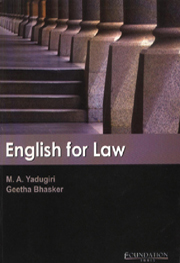Book contents
- Frontmatter
- Preface
- Contents
- A Note to the Student
- Notes to the Teacher
- 1 Nature of Law
- 2 Crimes and Civil Wrongs
- 3 Command of Language in the Profession of the Law
- 4 Plain Language and the Law
- 5 The Indian Constitution
- 6 The Impact of Technology on the Practice of Law
- 7 The International Court of Justice
- 8 Application of Precedents
- 9 Statutory Interpretation
- 10 Legal Reasoning
- 11 Plaints and Writs
- 12 Judgment
- 13 Of Defamation
- 14 Consumer Protection (Amendment) Act, 1993
- 15 The Information Technology Act, 2000
- 16 Universal Declaration of Human Rights
- Answer Key
13 - Of Defamation
Published online by Cambridge University Press: 26 October 2011
- Frontmatter
- Preface
- Contents
- A Note to the Student
- Notes to the Teacher
- 1 Nature of Law
- 2 Crimes and Civil Wrongs
- 3 Command of Language in the Profession of the Law
- 4 Plain Language and the Law
- 5 The Indian Constitution
- 6 The Impact of Technology on the Practice of Law
- 7 The International Court of Justice
- 8 Application of Precedents
- 9 Statutory Interpretation
- 10 Legal Reasoning
- 11 Plaints and Writs
- 12 Judgment
- 13 Of Defamation
- 14 Consumer Protection (Amendment) Act, 1993
- 15 The Information Technology Act, 2000
- 16 Universal Declaration of Human Rights
- Answer Key
Summary
Defamation Section 499. Whoever by words, either spoken or intended to be read, or by signs or by visible representations, makes or publishes any imputation concerning any person intending to harm, or knowing or having reason to believe that such imputation will harm; the reputation of such person, is said, except in the cases hereinafter excepted, to defame that person.
Explanation 1. It may amount to defamation to impute anything to a deceased person, if the imputation would harm the reputation of that person if living, and is intended to be hurtful to the feelings of his family or other near relatives.
Explanation 2. It may amount to defamation to make an imputation concerning a company or an association or collection of persons as such.
Explanation 3. An imputation in the form of an alternative or expressed ironically, may amount to defamation.
Explanation 4. No imputation is said to harm a person's reputation, unless that imputation directly or indirectly, in the estimation of others, lowers the moral or intellectual character of that person, or lowers the character of that person in respect of his caste or of his calling, or lowers the credit of that person, or causes it to be believed that the body of that person is in a loathsome state, or in a state generally considered as disgraceful.
- Type
- Chapter
- Information
- English for Law , pp. 422 - 455Publisher: Foundation BooksPrint publication year: 2005

